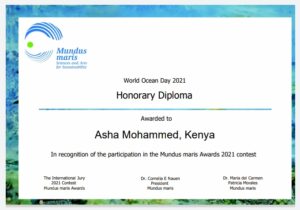
Early life
Asha Mohammed grew up near the ocean, more specifically, Shelly Beach in Likoni. Unlike most people in Mombasa, where the ocean receded into the background, becoming a silent feature of their daily lives, for Asha the ocean took center stage.
Perhaps, this is why at a young age, she became passionate about the plight of the ocean and its marine life. “I grew up watching how people treated the ocean; how they would litter without considering how what they’re throwing at the beach or in the water affects the ocean,” Asha says.
Asha, the young marine conservation advocate
In 2010, while she was in primary school, Asha took part in a competition to commemorate World Ocean Day. As part of the competition, she had to submit a drawing and an essay. “I didn’t win in this competition, ” she admits. “But I like to believe that my essay had an impact, because after that my school started environmental projects such as beach clean-ups and other wildlife and habitat conservation projects as well.”
From these school activities, Asha developed a wider perspective on environmental issues that stretched beyond marine conservation. She became active in environmental conservation activities in her primary school, and even later when she joined Hatua Network as a beneficiary. “We used to have projects at Hatua when I was in high school. We had regular beach cleaning days where we would comb the beach, collecting plastics and anything that was non-biodegradable which could put marine life at risk,” she says.
Samba & Kumba Mundus maris award
As Asha’s passion grew, so did her need to access a larger platform. This year when Mundus maris invited submissions from all around the world based on the UN’s World Ocean Day theme: “The Ocean: Life and Livelihoods”, Asha once again dipped her toes in the water (metaphorically speaking). She submitted her essay, “The Kai”.
Unbeknownst to her, out of 61 submissions from 10 countries around the world, the international jury at Mundus maris selected her essay for the Samba and Kumba award. “I didn’t expect to win or be awarded anything other than the participation certificate, ” Asha says, “so being recognized like this at first was overwhelming, but it’s also very exciting. I’m just really honored to receive this award.”

The award has given Asha the motivation to be a voice for the “voiceless ocean”. For her, simply being seen is not enough. “You can do something and people will see you doing it but they won’t feel the impact you are trying to create,” Asha explains. “What I’m trying to achieve is that impact. I want people to hear what I’m saying and choose to change their behaviour because of what I’ve said or shown them.”
What’s next for Asha?
For now, the prize money is a good start to further Asha’s commitment to conserving the marine environment. “I think what made me win this prize — talking about the ocean — is what I’ll put the money back into,” she says. Asha plans on using the money to buy water and snacks, and then inviting her friends to do a beach clean up, among other activities.
Other than her love for the ocean and the marine environment, Asha is a budding cyber security analyst. Thanks to her Hatua scholarship, she is currently studying for a Computer Security & Forensics degree at Kabarak University. However, it’s her love for the ocean that keeps pushing her to do things outside her comfort zone.
In her final parting shot, Asha has this to say: “We think that the only people affected by the ocean are those who live near it, but that’s not true. Issues like global warming and the greenhouse effect which affect everyone can be stopped. If we’re conserving the ocean, we are conserving the world as a whole.”

To read Asha’s essay, The Kai, click here.
To find out more about Mundus maris and its marine conservations efforts, click here.
Interested in supporting Hatua Network and its programs? Click here.